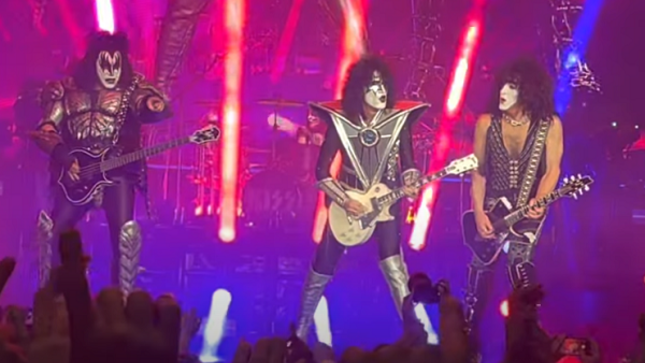
Marketing is a magical thing. In the age of targeted ads and home assistants that listen to your every word, it’s barely possible to think about a product without it appearing as a suggested purchase on Amazon. Still, whatever you think about adverts, there’s no denying the fact that many of the things we purchase, download, listen to, or watch, arrive in our minds from one type of marketing or another.
While some quarters of the metal world insist on remaining underground, especially black metal, music has become a highly marketable thing. Heavy metal songs have been appearing in video games since Guitar Hero and Rock Band turned numerous pieces of plastic into genuine noise-makers while the mask-wearing nonet Slipknot recently starred in the online title Smite.
KISS
Mashing together entities from two or more different worlds might seem like a waste of time and money but crossovers are big business. The number of properties that Netflix drama Stranger Things has appeared with now exceeds ten, for example. But why bother? The answer is all to do with audience sizes. Aligning a product with another one means that both parties get to engage with a second customer base.
Much the same philosophy is followed in casino gaming, too. While there are plenty of websites that continue to adhere to a ‘classic’ way of doing business, decorating games with unique IPs, a trend for licensing pop culture phenomena is rapidly gaining traction with developers. So, you’re just as likely to find a video slot representing Lara Croft or Batman as you are to find one based on something generic.
What's interesting about this type of marketing is that it can transcend international borders and even languages. In France, the La Riviera website provides what’s locally known as meilleurs jeux au casino - the best casino games. Here, there's not much similarity between the IPs listed at American or British casinos and those at French casinos. Cross the (digital) road, though, and the page at Le Roi Johnny (another French casino) features a Kiss: Reels of Rock slot game, with pictures of all four band members.
Merchandising
Kiss might not be popular with the 18-30 demographic but they remain an extremely marketable outfit. Magazine site Medium reports that
merchandising of Kiss raked in $500m between 2001 and 2016, something quite remarkable for a band that hasn’t produced a studio album since 2012. Oddly enough, frontman Gene Simmons is more likely to be found on TV, these days.
Guns N’ Roses, Motörhead, and Jimi Hendrix have achieved much success with crossover marketing in the past, as well. It might be precisely what some music fans consider “selling out” but it’s hard to deny the appeal of a new audience to hawk music and t-shirts to. On tour, it’s possible for some acts to earn hundreds of thousands just from clothing and CD sales - even if the arena takes a good 35%.
It might not be rock n’ roll but, wherever there’s money to be made, you’re likely to find many of the biggest bands in the world.